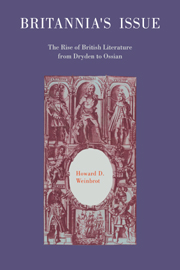Book contents
- Frontmatter
- Contents
- Acknowledgments and editorial notes
- INTRODUCTION: An overview of scope and method
- PART I CONTEXTS: INTELLECTUAL, PSYCHOLOGICAL, AND NATIONAL
- PART II TEXTS WITHIN CONTEXTS. ESSAYING ENGLAND: OUR GENIUS, OUR CLIME
- PART III GROWING ONE'S OWN. THE BRITISH ODE FROM COWLEY TO GRAY
- PART IV EXPANDING THE BORDERS. JEWS AND JESUS: THIS ISRAEL, THIS ENGLAND
- Prologue to Part IV
- 11 THE HOUSE OF DAVID AND THE HOUSE OF ST. GEORGE: PHILOSEMITISM, HEBREWS, AND HANDEL
- 12 BEYOND THE HEBREW LEAVEN: SMART AND THE GOD IN CHRIST
- PART V CELTS, GERMANS, AND SCOTS: TOWARDS A UNITED KINGDOM
- APPENDIX: The text of Handel's “Israel in Egypt”
- Index
11 - THE HOUSE OF DAVID AND THE HOUSE OF ST. GEORGE: PHILOSEMITISM, HEBREWS, AND HANDEL
Published online by Cambridge University Press: 15 December 2009
- Frontmatter
- Contents
- Acknowledgments and editorial notes
- INTRODUCTION: An overview of scope and method
- PART I CONTEXTS: INTELLECTUAL, PSYCHOLOGICAL, AND NATIONAL
- PART II TEXTS WITHIN CONTEXTS. ESSAYING ENGLAND: OUR GENIUS, OUR CLIME
- PART III GROWING ONE'S OWN. THE BRITISH ODE FROM COWLEY TO GRAY
- PART IV EXPANDING THE BORDERS. JEWS AND JESUS: THIS ISRAEL, THIS ENGLAND
- Prologue to Part IV
- 11 THE HOUSE OF DAVID AND THE HOUSE OF ST. GEORGE: PHILOSEMITISM, HEBREWS, AND HANDEL
- 12 BEYOND THE HEBREW LEAVEN: SMART AND THE GOD IN CHRIST
- PART V CELTS, GERMANS, AND SCOTS: TOWARDS A UNITED KINGDOM
- APPENDIX: The text of Handel's “Israel in Egypt”
- Index
Summary
Defining a modern British nation was and is a difficult, evolving, and varied task. One part, we know, includes disengagement from the classical pantheon of shop-worn deities. Samuel Johnson thought Milton's school-boy classicizing in “Lycidas” morally and poetically offensive – “easy, vulgar, and therefore disgusting.” The Christian antidote to such poison was available at any spiritual apothecary. Another antidote, however, was less obvious but nearly as compelling – the fruit of Hebrew religion, language, and culture. These were shaken from a more distant limb on the British family tree, one apparently exotic but actually congenial for the native needs and trends it both reflected and enhanced. Such congeniality was useful in Albion whether the Hebrews were regarded as equals or dubiously respected as inferiors. In either case, the experiences of the ancient Hebrews were thought part both of ancient and modern Britain.
This Excellent Religion
Association with what Joseph Addison's father Lancelot calls “this excellent Religion” is flattering to a nation for whom philosemitism often is a received truth of British intellectual and emotional life. Numerous commentators taught that Hebrew was the world's original, complete, and perfect language; it also was spoken by God and written by the prophets. Jehudah Stennett prefaces his Comprehensive Grammar of Hebrew (1685) with the news that Hebrew was the “Tongue of Adam” and thus the language in which all things were named, and in which God's own finger engraved “his own law.” It is a “Tongue worthy to be wrote in Characters of Gold.” That often repeated wisdom makes a trans-Atlantic flight and appears in Stephen Sewall's lectures on Hebrew and oriental literature before Harvard College's eager students in 1767.
- Type
- Chapter
- Information
- Britannia's IssueThe Rise of British Literature from Dryden to Ossian, pp. 408 - 445Publisher: Cambridge University PressPrint publication year: 1993

